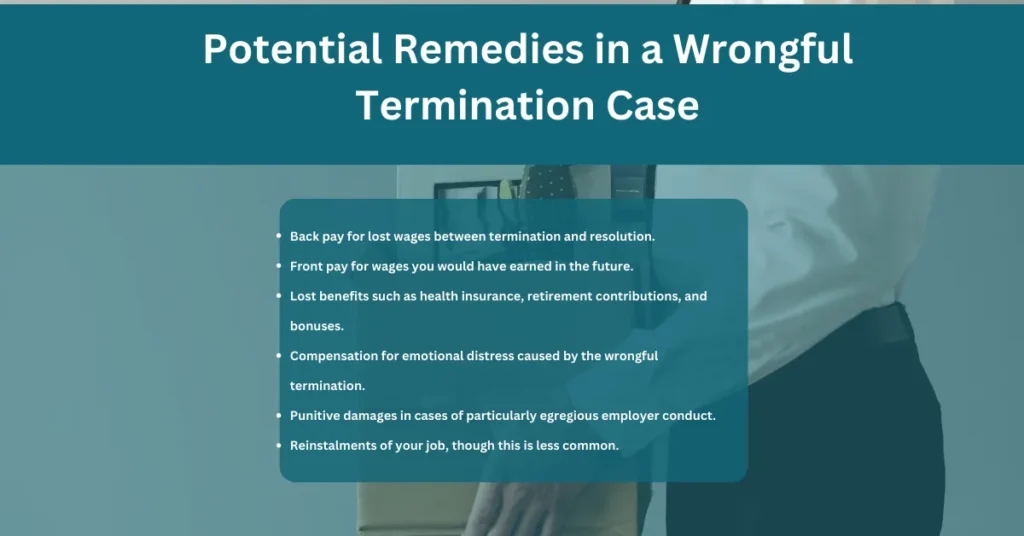Being fired is never easy, but when that termination feels unfair or retaliatory, the situation becomes even more stressful. Many Oregon employees wonder: Was my firing legal? Do I have any recourse?While Oregon is an at-will employment state, meaning employers can generally terminate employees without cause, there are important exceptions. When those exceptions apply, the firing may be considered wrongful termination.
In these cases, awrongful termination lawyercan step in to protect your rights, help you navigate complex employment laws, and pursue the compensation you deserve. This guide explains employee rights in Oregon, what counts as wrongful termination, how a lawyer can help, and the steps you should take if you believe you were wrongfully fired.
TL;DR
Wrongful termination in Oregon occurs when an employee is fired for illegal reasons such as discrimination, retaliation, or contract violations. A wrongful termination lawyer can help gather evidence, file claims with BOLI or EEOC, and pursue financial compensation. Act quickly strict deadlines apply.
Employee Rights Under Oregon Employment Law
Oregon follows the at-will employment doctrine. This means an employer can let an employee go at any time, for any reason — or for no reason at all — without needing to provide advance notice. However, this rule has limits. Employers cannot terminate someone for illegalreasons.
You have protected rights under both federal and state laws, including:
- Anti-discrimination lawsunder Title VII of the Civil Rights Act, the Americans with Disabilities Act (ADA), and the Age Discrimination in Employment Act (ADEA).
- Oregon state protectionsagainst discrimination based on race, religion, sex, sexual orientation, marital status, veteran status, and more.
- Whistleblower protectionsthat prevent employers from firing workers who report illegal activity or unsafe conditions.
- Leave protectionsunder the Family and Medical Leave Act (FMLA) and Oregon Family Leave Act (OFLA).
- The Bureau of Labor and Industries (BOLI)in Oregon, which enforces workplace rights and investigates employment complaints.
These laws set the stage for identifying wrongful termination.
.

What Counts as Wrongful Termination?
Not every firing feels fair, but not every firing is illegal. Wrongful termination occurs when an employer violates a law or public policy in the way they let you go. Common scenarios include:
- Discrimination-based firing
Termination because of race, gender, age, disability, religion, sexual orientation, or another protected category. - Retaliation
Being fired for reporting harassment, filing a workers’ compensation claim, or standing up against unsafe work practices. - Violation of leave laws
Losing your job for taking family or medical leave protected under federal or state law. - Breach of contract
If you have an employment contract or written agreement that outlines when and how termination can occur, firing you in violation of that agreement may be wrongful. - Public policy violations
For example, firing someone for serving on a jury or refusing to break the law.
Each of these circumstances can form the basis of a wrongful termination claim.
How a Wrongful Termination Lawyer Builds Your Case
Employment law is complex, and employers often have legal teams protecting their interests. A wrongful termination lawyer helps level the playing field by:
- Providing an initial consultation
Reviewing the facts of your termination and evaluating whether you have a claim. - Gathering evidence
Collecting documentation such as emails, performance reviews, termination letters, and witness statements. - Filing with agencies
Submitting complaints to BOLI or the Equal Employment Opportunity Commission (EEOC) within required deadlines. - Negotiating settlements
Seeking financial compensation without going to court, if possible. - Litigating in court
Representing you in front of a judge or jury if negotiations don’t resolve the issue. - Protecting against retaliation
Ensuring your employer does not retaliate against you for asserting your rights.
Their role is both legal and strategic, giving you the best chance to succeed.
Common Mistakes Employees Make After Being Fired
Many employees unintentionally harm their own cases by making hasty decisions. Mistakes to avoid include:
- Signing severance agreements without advice
Employers sometimes offer severance pay in exchange for waiving your right to sue. Signing without legal review can close off your options. - Not saving documentation
Every email, performance review, and HR complaint may become critical evidence. - Delaying action
Wrongful termination claims have strict filing deadlines. Waiting too long can result in losing your right to pursue a case.
Taking the employer’s explanation at face value
Employers may provide a reason that sounds legitimate but hides discriminatory or retaliatory intent. A lawyer can help uncover the truth.

Potential Remedies in a Wrongful Termination Case
If your claim is successful, you may be entitled to compensation and other remedies. These can include:
- Back payfor lost wages between termination and resolution.
- Front payfor wages you would have earned in the future.
- Lost benefitssuch as health insurance, retirement contributions, and bonuses.
- Compensation for emotional distresscaused by the wrongful termination.
- Punitive damagesin cases of particularly egregious employer conduct.
- Reinstatementof your job, though this is less common.
Each case is unique, and the outcome depends on the facts, evidence, and strength of the claim.
Choosing the Right Wrongful Termination Lawyer in Oregon
Selecting the right attorney is critical to the success of your case. Consider:
- Experiencespecifically in employment law.
- Knowledge of Oregon employment protectionsand filing procedures.
- Track recordof handling wrongful termination cases.
- Willingness to negotiate and litigate.
- Compassionate approach,since wrongful termination can be emotionally taxing.
Consultations are often free, giving you a chance to evaluate whether a lawyer is the right fit.
Steps You Should Take Now If You Suspect Wrongful Termination
If you believe your firing may have been unlawful, act quickly:
- Collect employment recordsincluding emails, contracts, performance evaluations, and pay stubs.
- Document a timelineof events leading up to your termination.
- Avoid posting on social mediaabout the firing, as these statements can be used against you.
- Contact a lawyer before signingany severance agreements or waivers.
- File complaints on timewith BOLI or EEOC if your lawyer advises.
Taking these steps preserves your rights and strengthens your case.
Conclusion
Wrongful termination cases are challenging but winnable with the right support. Employees in Oregon have legal protections against discrimination, retaliation, and unlawful firing practices. Acting quickly, preserving evidence, and working with an experienced advocate can make all the difference.
If you suspect you were wrongfully terminated, don’t face the process alone. A skilledwrongful termination lawyer in Oregoncan guide you through the legal system, protect your rights, and fight for the compensation you deserve.
FAQs
Can I sue my employer for firing me without cause in Oregon?
Not usually, since Oregon is at-will. However, if your firing was due to discrimination, retaliation, or violated laws, you may have a claim.
What proof do I need for wrongful termination?
Save emails, HR complaints, performance reviews, and termination letters. Witness statements may also be useful.
Should I sign a severance agreement?
Not without legal review. Severance agreements often waive your right to sue.
What’s the deadline for filing a claim?
Typically 180–300 days depending on whether you file with BOLI or EEOC.
How long does a wrongful termination case take?
Some cases resolve in months through negotiation, while others can take a year or more in court.



